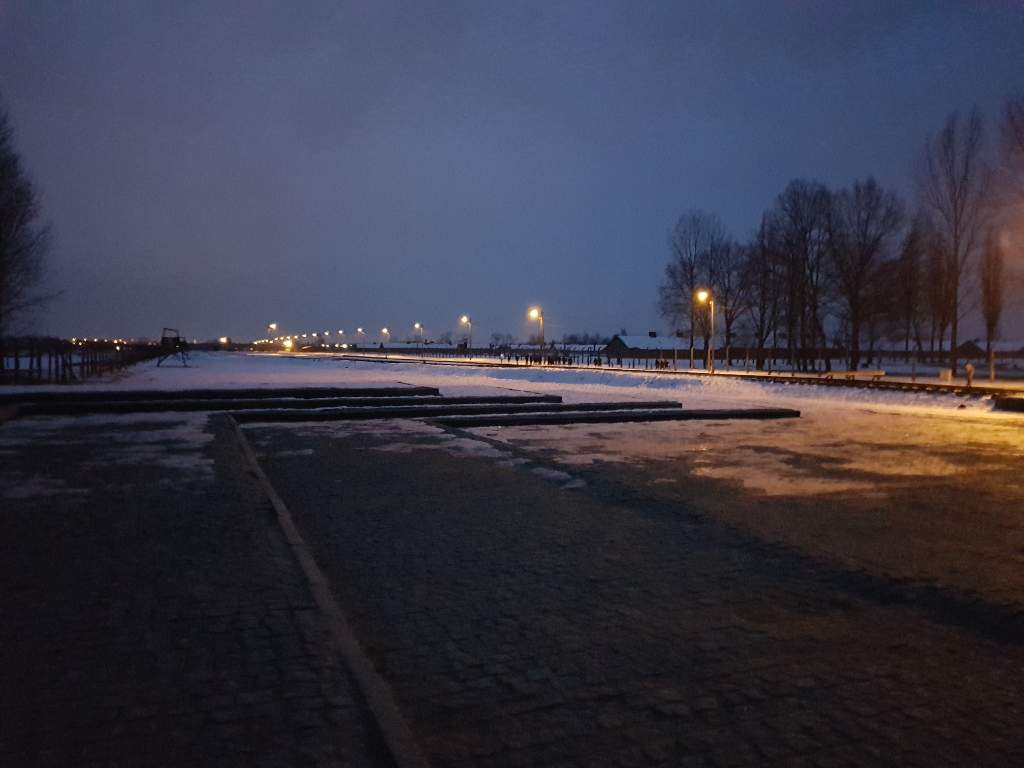Lessons from Auschwitz
Becoming a Holocaust Educational Trust Ambassador
by Melody Cremer
In February 2018, I stood upon one of the worlds’ biggest graveyards. It was not covered with tombstones or flowers, however, but cattle sheds. These cattle sheds were filled with bunk beds- if they could even be called beds. I don’t know when the magnitude of where I was standing hit me. I felt numb. This was a place where people were degraded to no more than animals, dehumanised, forced to sleep in barns designed for German cattle. I was standing in Auschwitz Birkenau: an extermination camp, once the centre of Nazi occupied Europe.
In the depths of winter in 1941, temperatures in Poland plummeted to -25 degrees. Prisoners in Auschwitz wore thin pyjamas, often barefoot or in uncomfortable wooden clogs. Our group stood upon the frozen ground, shivering despite our thick warm clothes in -7 degree temperatures. Perhaps it was then I realised the magnitude of Auschwitz, and the mercilessness of its perpetrators. How could man treat his fellow men as cattle? Was it apathy? Fear? Evil? This is one of my lasting memories from visiting Auschwitz.
My name is Melody Cremer, and I am a Regional Ambassador for the Holocaust Educational Trust (HET), representing the Thames Valley and the Chilterns. In 2018 I took part in the Lessons from Auschwitz project. Through the project, I was able to watch a Holocaust survivor share their testimony, take part in a one day visit to Auschwitz, and then share what I’d learnt from the visit with my school community.
Each year Bishop’s Hatfield Girls’School offers two students the opportunity to take part in the Lessons From Auschwitz Project. Despite a high volume of applicants, only 2 students can go per school. There are no hidden criteria: you do not have to have studied History at GCSE or A Level, nor do you need an in-depth knowledge of the Holocaust. I dropped History after GCSE, and did not want to take it up at a higher level. I wanted to go on the Lessons from Auschwitz project so that I could help challenge modern day discrimination and Holocaust Denial.
If you are not chosen, you can still play a role in Holocaust Education. The HET Ambassador Conference (AmCon) is an enormous event held each year in London, bringing students from across the UK together. Famous speakers such as Robert Rinder are joined by Holocaust survivors sharing their testimonies, and world leading historians giving insights into their groundbreaking research.
There are two compulsory seminars for those who take part. Your first seminar will involve watching a Holocaust survivor share their testimony, as well as an opportunity to learn more about pre-war Jewish life and the Holocaust. Many people will never get to hear a Holocaust survivor share their testimony; we are the last generation. I have heard three Holocaust survivors share their testimonies. In the past year, two of them have passed away. The legacy of their stories has driven me, as I am determined to ensure that what they experienced is never forgotten.
The visit itself will occur shortly after the first seminar. Practicalities surrounding clothing, food, transport and costs can be found on the Holocaust Educational Trust’s website (https://www.het.org.uk/lessons-from-auschwitz-programme). The one day trip is heavily subsidized, costing just under £60.00.
There is no singular way you should react to what you will see. There is no obligation to cry: I felt numb, crying when I got home and the magnitude of what I had witnessed hit me. The scale of loss is incomprehensible: families and friends torn apart in the grim efficiency of the Nazi regime. You will attend a follow-up seminar where you can discuss the visit with others, helping you to process what you have seen and then decide how best to share the lessons you learned from it.
As part of LFA you must commit to sharing the lessons that you have learned through visiting Auschwitz and hearing a survivor share their testimony (your ‘Next Steps’). This can be anything: from making a film or presenting an assembly, through to teaching a history class about Auschwitz. It will be your role to humanise the Holocaust: using human stories, not facts and numbers.
You can continue to work with HET after your next steps. Events, such as museum visits, are held for ambassadors throughout the year. If you wish to take your role further can apply to become a Regional Ambassador, an excellent opportunity that allows you to meet others passionate about Holocaust education, and work alongside them on local projects.
I hope you apply to take part in the Lessons from Auschwitz Project. It is an unforgettable and hugely impactful experience. As a Holocaust Educational Trust Ambassador you will become part of a network of over 39,000 people, all determined to educate their communities about the Holocaust.







